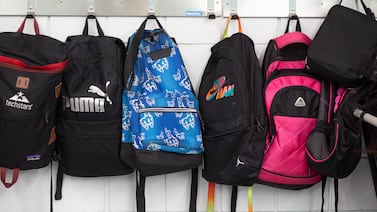Claudia Loya turned 18 in quarantine. Later this month, she’ll graduate high school virtually, and it’s possible she’ll start college in the fall remotely, too. If she had known that one Friday in March would be her last at school, she said she would have done things a little differently.
“What saddens me the most is that I didn’t know that my last day was my last day,” said Loya, a senior at Denver’s John F. Kennedy High School. “I didn’t get to properly say my goodbyes. I miss my teachers, I miss my classmates, I miss complaining about school.”
Loya is one of the 92,000 Denver Public Schools students who have been learning online since school buildings shuttered March 13 to stem the spread of the coronavirus. The switch from in-person to remote learning has been monumental, and not without challenges.
The school district scrambled to get students laptops and internet access, adjust special education plans, and write online lessons in both English and Spanish. Most but not all students are connecting with their teachers; the district reported 82% attendance earlier this month.
For Loya, the shift to remote learning was both easy and hard. It was easy because she’s only taking two core classes: Advanced Placement Calculus and a college-level English class that was already online. Those are the only courses she has to worry about finishing remotely.
The rest of her classes are student leadership courses, some of which haven’t translated as well online. That’s the hard part: Loya, the youngest of six children and the only one still living at home with her mom, misses being around people and the hands-on learning she loves.
She’s especially sad about the cancelation of her last overnight trip to Balarat, the district’s mountainous outdoor education center. Loya was serving as a high school leader for groups of fifth graders. It’s a district tradition for them to take a two- or three-day trip to Balarat. Loya missed her own Balarat rite of passage when her family moved to Texas for a year, and she was relishing experiencing it with a whole new crop of fifth graders.
“You’re just like a big role model to them,” she said. “They think high schoolers are so cool. “They’re like, ‘Ms. Claudia, Ms. Claudia, do you know TikTok?’ I’m like, ‘Yeah, I’m not that old.’”
Without the structure of school, Loya has drifted into the nocturnal schedule favored by most teenagers. She goes to bed at 3 a.m. and sleeps until 1 p.m. if she can. If she has a student council meeting at 10:30 in the morning, she wakes up for the call and then goes back to bed. She eats, hangs out with her mom, and watches “a lot of Netflix.”
She also recently started a job selling insurance. So far, she’s just doing online classes in the evenings to get her license. Her dad lost his job when the coronavirus hit Texas, where he worked in the construction industry to support his family living in Colorado.
Because Loya’s parents aren’t fluent in English, she filed his online unemployment claim. The process, she said, was “super confusing.”
“My parents think I know all of this technology, and I hate technology,” Loya said. “I was like, ‘Dad, I think you’re filed.’” Now the family is just waiting on the first check to come.
In the meantime, Loya is working with a college adviser from her high school to amend her financial aid application. She won a scholarship to Denver’s private Regis University for the full cost of her tuition. But she still has to come up with $12,000 for room and board — a daunting prospect that now seems even more out of reach.
Although she’d like to live on campus, Loya made an agreement with her mom that if she doesn’t get the extra financial aid, she’ll live at home and commute. Loya wants to study criminal justice and improve the legal system for people of color. When she talks to her friends about it, she often gets pushback. The system is corrupt, they say; cops are bad.
“Yes, the system is corrupt,” Loya said, “but my motto is, ‘If you want to change the system, you have to be in the system and work from the inside.’”
She was inspired by her own experience. As a preteen, she was caught violating the city’s curfew when she and a friend walked to a McDonald’s at 2 a.m. during a sleepover. She had to take a court diversion class, where she met kids accused of far more serious things.
One day, she said, a diversion teacher told a story about a former participant. He was a kid from a low-income family who wasn’t planning to go to college. His probation officer made his graduation from the diversion program contingent upon his applying for as many scholarships as possible. The boy ended up winning a full-ride scholarship to any college of his choosing.
“I was like, ‘I want to be that person for someone,’” Loya said.
But first, Loya has to finish high school — remotely. Even though she’s sad about missing milestones like prom and senior ditch day, and although she’ll likely graduate via Zoom, she said she’s trying to focus on the positive. Everything happens for a reason, she said.
“I’m obviously going to have a story to tell my kids later on,” she said.








